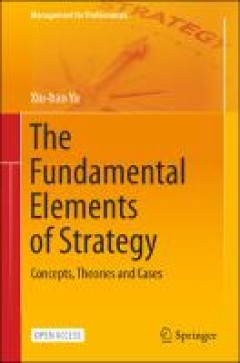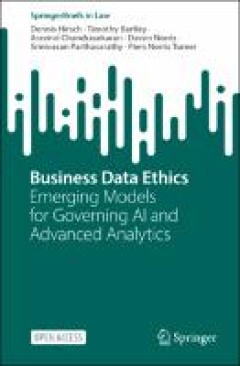Ditapis dengan
The Inspiration of Tao Zhu-gong : Modern Business Lessons from an Ancient Past
This book discusses the 12 business principles of Tao Zhu-gong and relates them to today's corporate setting. They state 12 vital abilities that one will need in order to succeed in business. Ranging from handling customers and employees to managing a company and its products to making business decisions, the principles cover most of the areas necessary for a business to develop. The 12 princip…
- Edisi
- -
- ISBN/ISSN
- 0130605654
- Deskripsi Fisik
- ix + 311 hlm; 15 x 23.5 cm
- Judul Seri
- -
- No. Panggil
- 174.4 CHO t
E-book If You’re So Ethical, Why Are You So Highly Paid? : Ethics, Inequali…
Why do some people appear to obtain a disproportionate share of income and wealth? The French economist Thomas Piketty, in his book Capital in the Twenty-First Century, frames the problem in a rather old-fashioned way as a tussle between capital and labour. His main thesis is that inequality is rising because the rate of return on capital, held disproportionately by the wealthy, exc…
- Edisi
- -
- ISBN/ISSN
- 9781909890954
- Deskripsi Fisik
- 198 hlm
- Judul Seri
- -
- No. Panggil
- 174.4 PEP i
E-book Fallibility at Work : Rethinking Excellence and Error in Organizations
Pilot Jarle Gimmestad sat in the cockpit at Oslo Airport one late even-ing, waiting for takeoff. “The flight was already delayed by one hour, and I was eager to get onto the runway. As usual, I was in dialogue with the co-pilot to make final adjustments before takeoff. Suddenly, the driver of the pushback tractor on the ground drew our attention to a wet sub…
- Edisi
- -
- ISBN/ISSN
- 9783319633183
- Deskripsi Fisik
- 174 hlm
- Judul Seri
- -
- No. Panggil
- 174.4 KVA f
E-book Putting Purpose Into Practice : The Economics of Mutuality
This book is about purpose or rather the achievement of purpose, whichis the realization of the highest form of aspiration of any organization orindividual.It is the argument of this bookthat the real battle our globalized worldis facing today is not between liberalism and protectionism, or betweenChina and the United States, or between globalization and nationalism,but rather between a sense o…
- Edisi
- -
- ISBN/ISSN
- 9780198870708
- Deskripsi Fisik
- 433 hlm
- Judul Seri
- -
- No. Panggil
- 174.4 MAY p

E-Book The Fundamental Elements of Strategy: Concepts, Theories and Cases
This open access book clarifies confusions of strategy that have existed for nearly 40 years through the core thoughts of three fundamental elements. Unlike the traditional definition of strategy as "a plan to achieve a long-term goal from overall considerations”in a linear view, this book defines strategy from non-linear viewpoint as it is in the real world. The art of a strategy lies not on…
- Edisi
- -
- ISBN/ISSN
- 9789813347137
- Deskripsi Fisik
- 193 halaman
- Judul Seri
- -
- No. Panggil
- 174.4 YUX t

E-Book Business Data Ethics: Emerging Models for Governing AI and Advanced An…
This open access book explains how leading business organizations attempt to achieve the responsible and ethical use of artificial intelligence (AI) and other advanced information technologies. These technologies can produce tremendous insights and benefits. But they can also invade privacy, perpetuate bias, and otherwise injure people and society. To use these technologies successfully, organi…
- Edisi
- -
- ISBN/ISSN
- 9783031214912
- Deskripsi Fisik
- 112 halaman
- Judul Seri
- -
- No. Panggil
- 650.0285 HIR b
 Karya Umum
Karya Umum  Filsafat
Filsafat  Agama
Agama  Ilmu-ilmu Sosial
Ilmu-ilmu Sosial  Bahasa
Bahasa  Ilmu-ilmu Murni
Ilmu-ilmu Murni  Ilmu-ilmu Terapan
Ilmu-ilmu Terapan  Kesenian, Hiburan, dan Olahraga
Kesenian, Hiburan, dan Olahraga  Kesusastraan
Kesusastraan  Geografi dan Sejarah
Geografi dan Sejarah